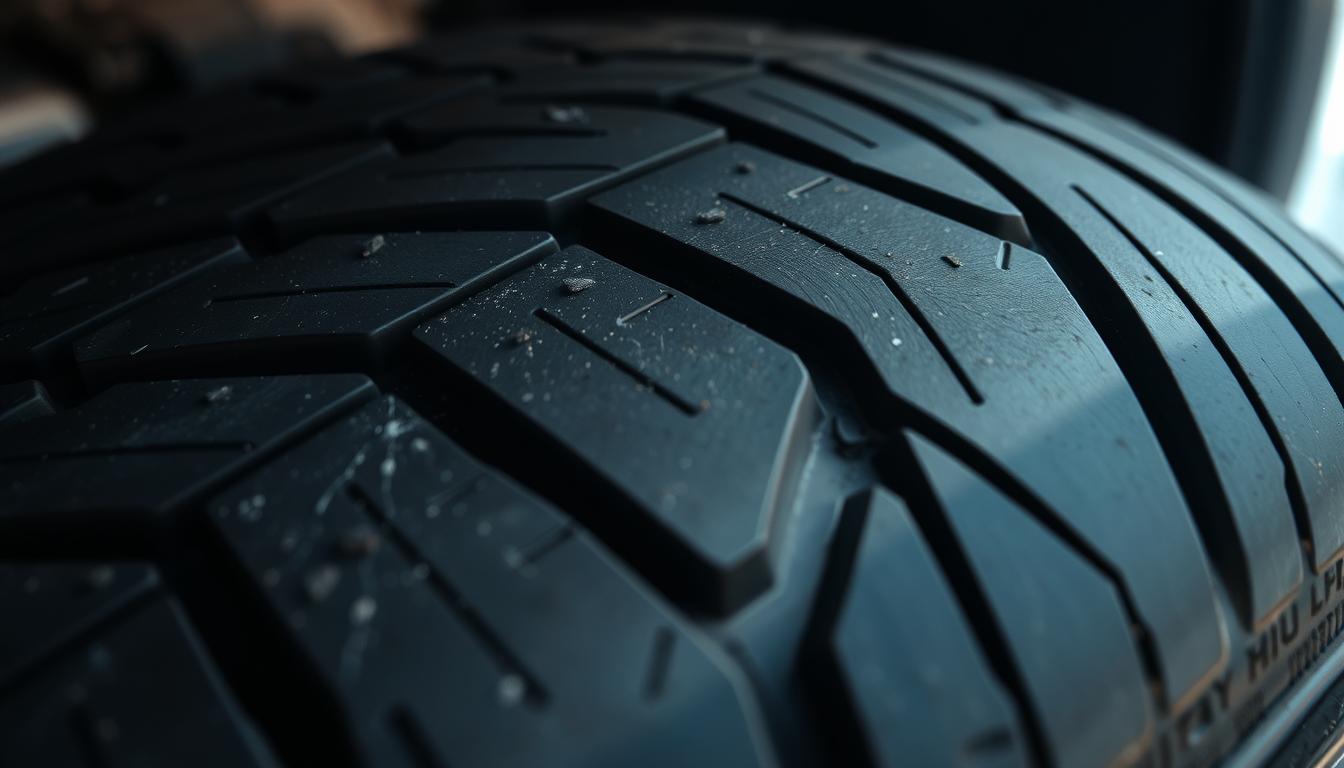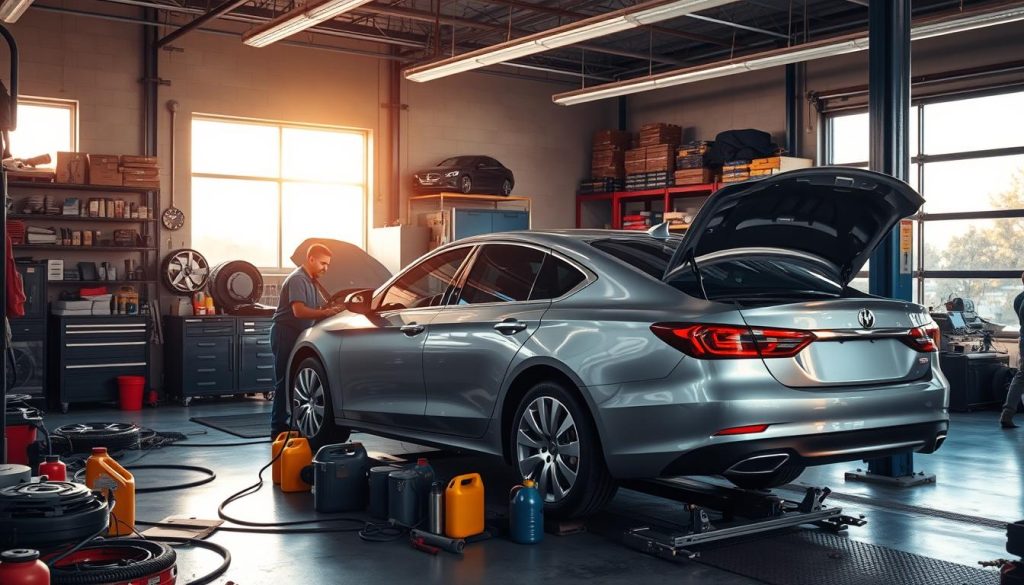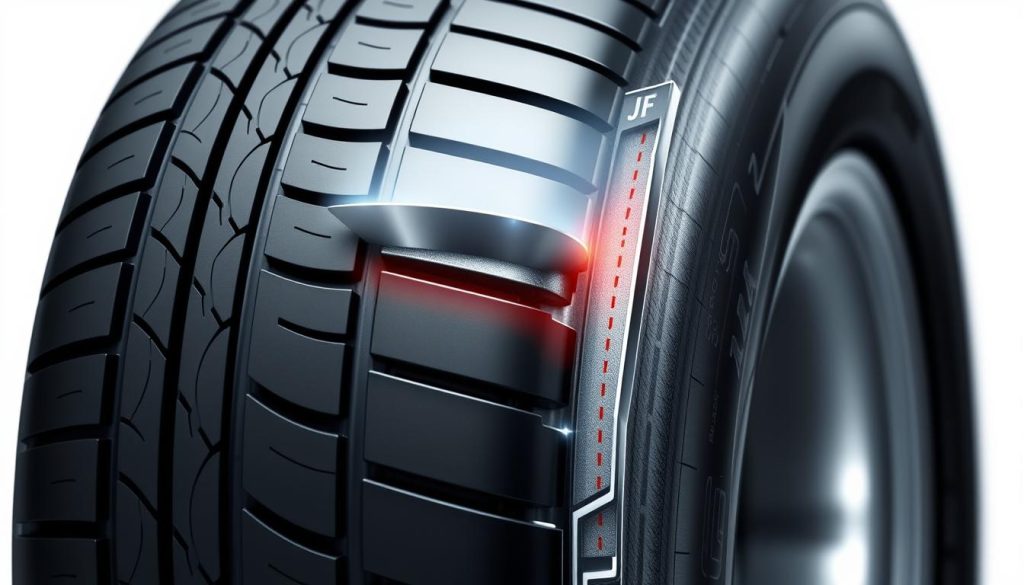Your car’s rubber meets the road every second you drive. These critical components do more than just roll – they shape your vehicle’s safety, steering precision, and braking power. When tread patterns change unexpectedly, they become messengers telling stories about your car’s hidden needs.
Irregular wear patterns act like a mechanic’s secret code. Feathering on one edge or bald spots circling a tire often point to alignment issues or suspension troubles. Even subtle changes in tread depth can signal when components need adjustment or replacement.
We see tires as diagnostic tools that speak through their wear. Cupping might reveal shock absorber problems, while center wear could indicate overinflation. Catching these signs early helps prevent costly repairs and keeps your drives safer.
Our team at Heaven Automotive deciphers these patterns daily. Let us translate your tire’s silent warnings into actionable solutions – because smooth rides start with balanced contact patches.
Key Takeaways
- Tire condition directly impacts steering control and braking effectiveness
- Specific wear patterns correlate with alignment or suspension issues
- Early detection prevents expensive mechanical repairs
- Proper inflation extends tread life and improves fuel efficiency
- Professional inspections catch hidden problems
- Balanced tires reduce vibration and improve ride comfort
Signs and Causes of Uneven Tire Wear
Four key factors transform your vehicle’s footprint: driving style, mechanical adjustments, air levels, and road contact. Each leaves distinct signatures across rubber surfaces that mechanics decode like tire hieroglyphics.
Driving Habits and Their Impact
Aggressive maneuvers rewrite tread stories. Quick lane shifts scrub rubber sideways, while panic stops carve flat spots. These actions:
- Scrape tread depth unevenly
- Overstress specific tread zones
- Accelerate replacement needs
Alignment and Suspension Secrets
Misaligned wheels drag tires sideways like stubborn mules. Worn ball joints or loose control arms let wheels wobble, creating:
- Feathered edges from angled contact
- Cupped dips from bouncing
- Patchy wear from unstable positioning
Pressure’s Hidden Influence
Air volume dictates tread contact shape. Underfilled tires sag, grinding outer shoulders. Overfilled ones bulge, wearing middle bands. Monthly pressure checks maintain ideal footprints.
Our technicians at Heaven Automotive map wear patterns to their root causes. Let us restore your tires’ proper contact with the road – schedule your alignment and suspension evaluation today.
How to Diagnose Tire Tread Wear Patterns
Your vehicle’s rubber contact points reveal critical information through their changing surfaces. Monthly visual checks help spot developing issues before they escalate. Start by walking around your car in daylight, examining each wheel for variations in tread depth or unusual markings.
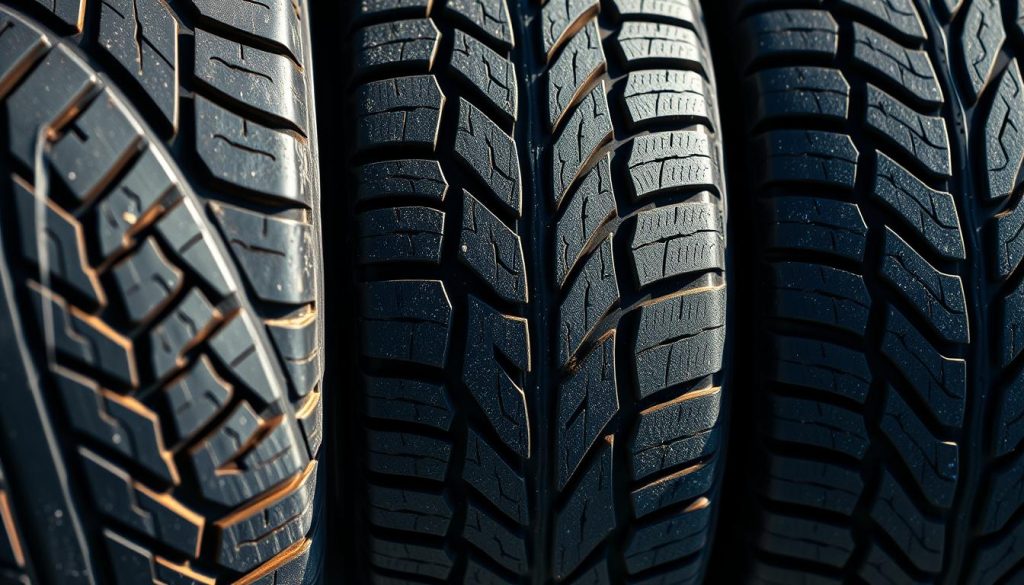
Visual Inspection and Hands-On Checks
Systematic evaluation begins with comparing tread depth across all four wheels. Look for smooth patches, feathering edges, or asymmetrical grooves. Run your palm across the surface to detect texture changes – rough areas often indicate alignment problems.
Pay special attention to:
- Center vs edge tread depth differences
- Cupped dips suggesting suspension wear
- Localized bald spots from braking habits
When to Seek Professional Analysis
While DIY checks catch obvious issues, complex patterns require expert evaluation. Our technicians use precision tools to measure millimeter-level variations and correlate them with specific mechanical faults. Bring your vehicle in if you notice:
- Multiple wear types across single tires
- Vibrations persisting after rotation
- Rapid tread loss in specific zones
Heaven Automotive’s diagnostic services map tread irregularities to their root causes – whether alignment, shocks, or driving habits. Schedule your comprehensive vehicle assessment today and transform mysterious wear patterns into actionable solutions.
Tips for Preventing Irregular Tire Wear
Consistent care keeps your vehicle’s foundation strong. Our approach combines scheduled checks with proactive adjustments to maintain optimal road contact.
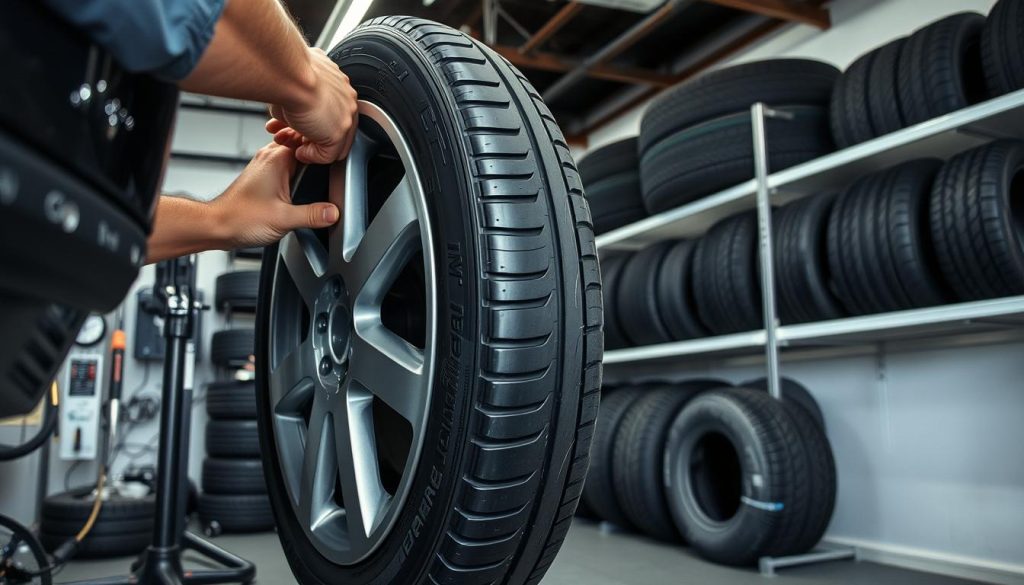
Pressure Checks and Position Changes
Monthly air pressure verification stops problems before they start. We use your owner manual specifications or door jamb sticker numbers as the gold standard. Proper inflation creates uniform contact patches that prevent edge grinding or center bulging.
Rotating wheels every 5,000-8,000 miles distributes stress evenly across all four positions. Front tires wear faster on steering axles, while rear ones handle different forces. Swapping locations balances these effects for longer tread life.
Alignment Precision and Cost Savings
Annual wheel alignment checks catch subtle shifts from potholes or curbs. Our laser-guided systems restore factory settings for straight tracking and reduced drag. Combined with balance corrections, this prevents vibrations that accelerate tread loss.
Clients who follow these steps typically see:
- 20% longer tire lifespan
- Improved fuel economy
- Smoother steering response
Let Heaven Automotive create your personalized maintenance plan. Our experts handle pressure adjustments, rotations, and alignments – schedule your appointment today for lasting performance.
Why Tires Wear Unevenly
Your vehicle’s foundation communicates through tread patterns. The physics of road contact dictate how rubber degrades, with air pressure and surface conditions acting as primary storytellers.
Understanding Overinflation Versus Underinflation
Air volume reshapes a tire’s footprint like clay. Too much pressure forces the center tread to bulge outward, grinding its middle section against pavement. Too little flattens the structure, scraping both edges simultaneously. Telltale signs include:
- Balding centers signaling overfilled chambers
- Worn shoulders pointing to underinflated units
- Feathered edges from inconsistent contact
The Role of Driving Conditions and Road Impact
Urban environments test rubber resilience daily. Potholes jolt suspension components, while debris-laden roads scrape tread surfaces. These factors accelerate wear:
- Bent rims from impact damage causing vibrations
- Temperature swings hardening or softening rubber
- Frequent stops eroding specific tread zones
Our technicians at Heaven Automotive decode these patterns through specialized diagnostics. We pinpoint whether your vehicle needs alignment corrections, pressure adjustments, or suspension repairs – then restore optimal performance. Schedule your comprehensive evaluation today and transform erratic wear into smooth, even tread life.
Conclusion
Road surfaces leave their mark on more than just pavement. Your car’s tread patterns act as living records of mechanical health, documenting every alignment shift and suspension hiccup. Spotting variations early transforms rubber into a diagnostic tool that speaks volumes about your vehicle’s needs.
Regular monitoring prevents minor issues from becoming major repairs. When irregular wear appears, it’s often whispering about wheel alignment drift or suspension component fatigue. Addressing these quickly preserves tread life and maintains precise steering control.
Our team decodes these stories daily. Through precise pressure checks and rotation schedules, we help drivers avoid premature replacements. Proper care enhances fuel efficiency while keeping all four wheels working in harmony.
Don’t let mysterious wear patterns leave you guessing. Trust Heaven Automotive’s experts to analyze your vehicle’s footprint and restore optimal performance. Schedule your comprehensive evaluation today – because smooth rides begin with understanding what your tires reveal.

